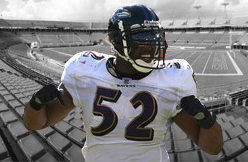A weeklong football academy for high school players was starting to drag on for some teenagers Friday.
That's when Baltimore Ravens linebacker Ray Lewis showed up.
"Listen up! You can succeed or fail," said the perennial All-Pro. "It's all up to you."
When Hannibal Navies asked Lewis to join the 360 Football Academy as a partner and advocate, Lewis didn't hesitate. He was sold on what Navies calls an unprecedented offering of services to high school football players.
Lewis cannot imagine how farther he could've gone in life by avoiding some teenage mistakes.
"Oh, man," the former Super Bowl MVP said. "There's no telling, but that time has passed. The point now is these young men here today have an unprecedented opportunity to get a head start."
The players were given advice by industry experts on the potential pitfalls of credit cards, NCAA compliance and performance enhancement.
Navies, a retired NFL linebacker whose best seasons were with Green Bay from 2004-05, and Jon Shibley, founder and CEO of Lenox Financial, spent the last 2 1/2 years planning the academy.
Open to high school players, the academy used former NFL and college standouts to teach football skills. The National Collegiate Scouting Association, which coordinates an exchange of information for approximately 35,000 college coaches, instructed players how to market themselves to Division I schools.
Lewis was one of 15 former and current NFL players who worked on the field with players, but inspirational messages were predominant during water breaks.
Former Indianapolis running back Dominic Rhodes was particularly blunt. He told about growing up in Abilene, Tex., and how his dream of playing for the University of Texas was derailed by poor grades and a low SAT score.
Recruiting services praised him. So did the local media. The Longhorns wanted to offer a scholarship, but Rhodes had no chance to qualify for admission.
"The next thing I know I'm in junior college and I had something like a 0.7 GPA my freshman year," Rhodes said. "It kind of hurt me. No, actually, not kind of hurt me. It did hurt me."
And it's the classroom work that Navies says makes his academy unique.
"I've never seen anything or heard of anything like it," said Franklin Stephens, head coach of Atlanta powerhouse Tucker High. "It's a special camp for so many different reasons, mostly because they're going to track (players progress) and that's why I've got a couple of my guys here."
Navies hosted the five-day event at Georgia Tech, where Kaplan representatives walked kids through the demands of college entrance exams, employees of online company EverFi talked to them about financial literacy, and officials from Team Doctors Preferred Access provided insight on sports rehabilitation and concussions.
"I didn't know how colleges look at your GPA and your SAT score differently," said Terrance Smith, a linebacker who's verbally committed to sign at Florida State and a rising senior at Atlanta's Southwest DeKalb High. "There's a lot to learn and the more you hear, the more questions you have."
Representatives from two companies, GetN10s and Competitive Edge Sports, gave lectures on appropriate training, and others from CRONS Achievers Program ran through the importance of attitude in setting and reaching goals.
Players also heard from William Swift, owner and president of Business Traveler Services and from Hob Nob Jobs, which showed the players what steps to take to help ensure steady employment after football.
"The classroom time — none of it is spent on football," Navies said. "I've done football camps through my (personal) foundation, but I didn't feel like I was really serving them for what to prepare for in life. If you just teach kids football and don't teach them the things that happen in life, I don't feel like you're doing them that much good."
Navies promises the academy will stay in contact with its 147 participants, whom he calls "student-athletes," throughout the next three school years — high school and college — to make sure deadlines are met and progress is made.
"I didn't want to be a five-day camp and say, 'Hey, good luck,'" Navies said.
The cost of the camp varied for individual participants. Some attended on full scholarships from corporate sponsors and others were on partial scholarships. Navies said a couple of the players even lived with other families because their parents were homeless.
Navies says he wants the program open to everyone. He remembers the difficulty in several parts of his life and the pain he endured trying to find solutions.
"That 1 percent, or even less, of high school players that one day make it to the NFL isn't what drives us," Navies said, "as much as it's the 99 percent that don't make it."
Click here to order Ray Lewis' proCane Rookie Card.

(dallasnews.com)



